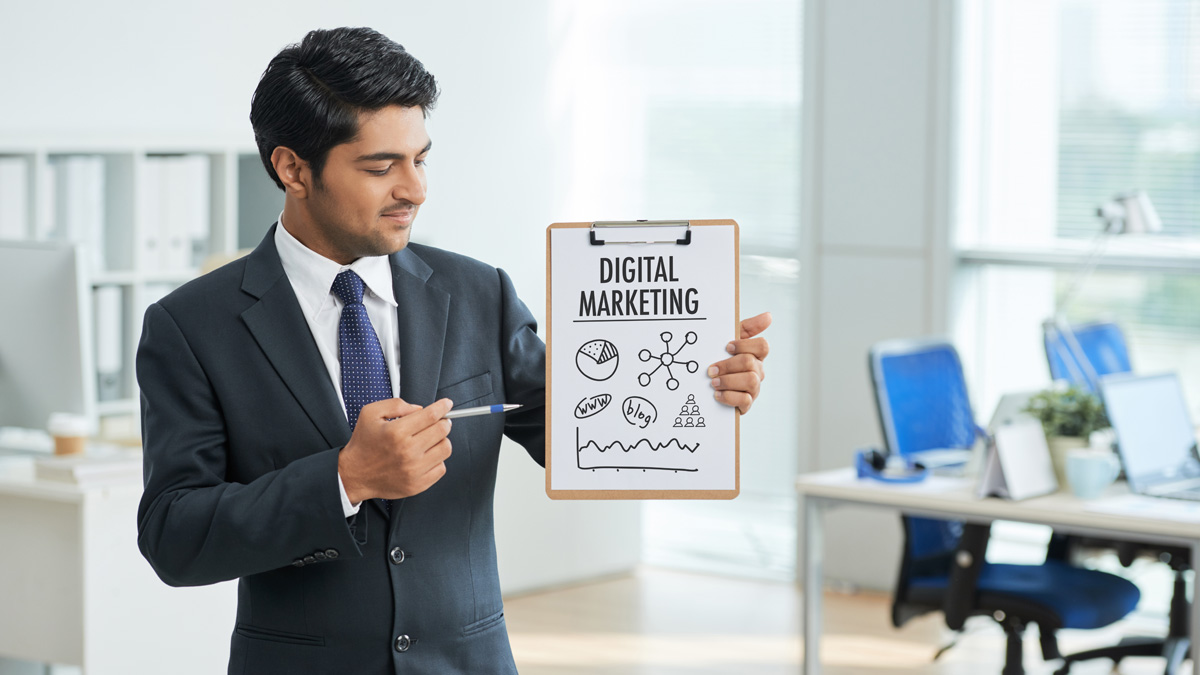Introduction
Old strategies of corporate survival are no longer sufficient in this digital era. Today, businesses are thriving due to the rapid adoption of digital marketing in business management. Whether you’re running a startup, managing a corporation, or studying to be the next big thing in business, understanding digital marketing in business management is no longer optional; rather, it has become a necessity.
The combination of data, creativity, and strategy that digital marketing in business management provides is the game-changer now. It enables business managers to access global audiences, increase consumer engagement, and confidently make data-driven decisions. But how does digital marketing in business management affect corporate management? Let us dive in and know about the influence and strategies that are going to affect the future.
Unpacking the Impact of Digital Marketing in Business Management
1. Real-Time Customer Insights for Smarter Decision-Making
Customer behaviour can be analysed in real time using digital marketing solutions such as Google Analytics, Meta Business Suite, and HubSpot. Business managers may monitor whether ads are effective, what items are popular, and how people interact with their platforms.
Stat fact: According to Salesforce (2023), 67% of marketing leaders report faster decision-making with real-time data.
Impact: Improved decision-making, faster pivots, and more personalised marketing tactics.
2. Cost-effective Campaigns with Measurable ROI
Traditional advertising media, such as television and print, are expensive and difficult to measure. In contrast, digital marketing provides cost-effective programs that produce measurable results, such as PPC (Pay-Per-Click), email marketing, and SEO.
Insight: Every £1 spent on email marketing yields an average return of £42 (DMA UK, 2023).
Impact: Business managers can do more with less while tracking every penny spent. Remember, staying calculative takes you far on the road to success.
3. Enhanced Brand Presence on Digital Platforms
Today’s customer journey involves several platforms, including Google, Instagram, LinkedIn, and YouTube. Digital marketing enables organisations to maintain consistent identity across all touchpoints, increasing trust and awareness.
Tip: Use integrated marketing methods to create a consistent cross-platform branding experience.
Impact: Increased brand awareness and consumer loyalty.
4. Improved customer engagement and retention
From chatbots and social media interactions to tailored emails and retargeting advertisements, digital marketing enables firms to communicate with customers rather than just at them.
FAQ: How does digital marketing help retain customers?
Long-term relationships are fostered by providing tailored experiences and compelling material.
Impact: Increased client retention, lower churn, and higher lifetime value.
5. SEO and Content Strategy Drive Organic Growth
Modern company websites rely heavily on organic traffic. SEO (Search Engine Optimisation) and content marketing help brands rank higher on Google, get quality prospects, and establish authority.
Stat Fact: According to HubSpot (2024), 75% of people never scroll beyond the first page of search results.
Impact: Improved visibility leads to greater leads and revenue.
6. Social media influences purchasing decisions
From Instagram influencers to TikTok trends, social media marketing is impacting purchasing decisions like never before. Business managers who use this well can significantly increase sales and brand loyalty.
FAQ: What are the greatest platforms for business marketing in 2025?
Depending on your sector and target demographic, Instagram, LinkedIn, and TikTok are the top platforms.
Impact: Provides immediate reach and credibility in a visually compelling way.
7. Agile Marketing = Faster Growth
A/B testing, audience segmentation, and fast feedback are all possible with digital marketing, which allows organisations to change their strategy in real time.
Case Study: Following a week of A/B testing, a UK-based e-commerce firm increased conversions by 120% merely by modifying its landing page.
Impact: Quickly responding to market demands promotes corporate growth.
8. Global Reach for Local Businesses
Establishing a global business no longer requires a global office. Local firms may use the correct digital marketing tools to attract worldwide audiences and enter new markets.
Stat Fact: 81% of small businesses feel internet marketing has helped them extend beyond their local reach (Google UK, 2024).
Impact: More customers, sales, and prospects.
9. AI and Automation Save Time and Boost Efficiency
Modern tools use artificial intelligence (AI) to predict trends, automate repetitive tasks, and personalise user journeys at scale.
FAQ: What role does AI play in digital marketing?
AI powers everything from content recommendations to chatbots, making processes smarter and faster.
Impact: Saves time, reduces errors, and enhances the customer experience.
10. Data-driven culture fosters innovation
Digital marketing is more than just selling; it’s also about learning. The data it gives drives innovation, product development, and improves management decisions. Takeaway: Business managers who understand digital marketing are better positioned to lead teams and innovate.
Impact: Future-ready enterprises based on data, creativity, and strategy.
Conclusion
The influence of digital marketing on corporate management is evident. From increasing income and reach to making better decisions and developing stronger brands, digital marketing is the driver for corporate growth in 2026 and beyond.
Whether you’re a student at SOC Higher Education aspiring to be a future leader or a company owner trying to expand your operations, embracing digital marketing isn’t just smart; it’s essential. Our approach to corporate management must adapt alongside the digital environment.
So, here’s the question: Are you prepared to use digital marketing to transform your business management game? Because your competition most likely already are.
FAQs
Digital marketing is the application of online platforms, technologies, and digital tactics to promote products, services, or brands to a specific audience. Unlike traditional marketing approaches, such as print or television advertising, digital marketing utilises the internet and digital devices to develop quantifiable, interactive, and targeted campaigns. It encompasses a wide range of activities such as search engine optimisation (SEO), social media marketing, pay-per-click (PPC) advertising, email campaigns, influencer partnerships, and content marketing. At its foundation, digital marketing is about connecting with customers where they spend the majority of their time – online – and building meaningful relationships that promote engagement, loyalty, and sales.
A: Yes! Digital marketing’s insights, reach, and cost-efficiency may benefit any industry, from retail to healthcare to education.
A: Absolutely. Digital marketing levelizes the playing field by enabling small businesses to target specific consumers and adjust swiftly.
- SEO and SEM
- Social media management
- Email Marketing
- Data analytics
- Content strategy
- AI and automation tools.
Almost every modern organisation, from start-ups to multinational businesses, employs digital marketing to boost its presence and reach customers more efficiently. Tech behemoths like Apple, Amazon, and Google invest extensively in online ads to retain brand awareness. Retailers such as ASOS and Tesco use social media and email marketing to engage their customers and increase sales. Smaller businesses, such as local cafés, boutique stores, and professional service organisations, use digital tools like Google Ads, Instagram, and LinkedIn to reach out to specific audiences at a low cost. Indeed, because to its versatility, digital marketing is not confined to large enterprises; it is also available to SMEs, charities, educational institutions, and freelancers looking to increase their visibility and interact with clients.
In business, digital marketing is the integration of internet advertising methods into overall management and growth goals. It’s more than just advertising; it’s about creating a customer experience that starts with awareness and finishes with loyalty. Businesses use digital marketing to analyse customer behaviour, assess market trends, and develop customised content that resonates with their target audience. It also allows firms to compete globally by removing geographical boundaries; for example, a small business in Birmingham can sell to clients in Europe or Asia using well-designed digital campaigns. Furthermore, digital marketing in business frequently includes data analytics and performance tracking, allowing managers to make better decisions and allocate resources than older techniques.
Modern businesses rely on digital marketing because it provides measurable, scalable, and cost-effective growth solutions. First, it gives businesses worldwide reach, allowing them to connect with clients outside their immediate area. Second, it enables precision targeting: organisations can send targeted communications to specific demographics, resulting in improved conversion rates. Third, digital marketing promotes two-way contact, allowing businesses to create trust and long-term connections through social media, chatbots, and customised content. Furthermore, the use of data analytics allows each campaign to be tracked, changed, and optimised for improved results. Without digital marketing, firms risk losing relevance in an increasingly digital-first world where customers demand convenience, customisation, and fast access to information.





